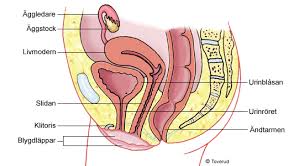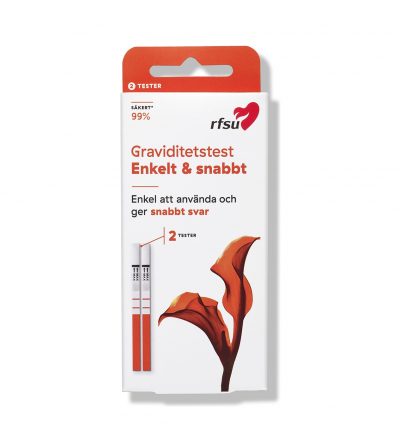
Trying to get pregnant? What factors can affect it?
About 8 out of 10 couples who try to conceive succeed within a year. Others have to wait longer. Trying to get pregnant can be stressful. But it is more common to have reduced fertility than to not be able to have children at all. Read about why it can be difficult and how you can increase your chances of getting pregnant.
Why do some couples have problems conceiving?
Approximately one in five couples at some point in their lives has difficulty having children. It can be stressful not being able to get pregnant when you want to, but it often helps to just be patient and keep on trying. When you have tried to get pregnant for a year without success, you can turn to healthcare.
It is more common to have reduced fertility, than not be able to have children at all. In case of reduced fertility, it may take longer to get pregnant.
Unprotected sex – what is the likelihood of getting pregnant?
When a healthy man and a healthy woman have unprotected intercourse ONCE, the chance of getting pregnant is about 2-4%. If the same couple tries to get pregnant by having unprotected intercourse throughout the ENTIRE menstrual cycle, the chance is about 20-25%. This is based on the assumption that:
- the woman’s ovaries are working well so that good quality eggs can mature
- the woman is ovulating – if your menstruation is regular, it usually means that you are also ovulating
- the fallopian tubes function so that an egg can be captured and fertilized by sperm that have swum up in the fallopian tubes, and that the fertilized egg can be transported down to the uterus
- the man has enough sperm and that they are active

- the endometrium can receive a fertilized egg so that it attaches and develops
- a functioning sex life
Getting help to conceive
If there are problems with one or more of the conditions above, you may need help. That is when an infertility investigation becomes relevant. The goal is to get answers to whether there are obstacles and, if so, what it is that is preventing you from having children. Only when you know what the problem is is it possible to do something about it. Childlessness can also be due to factors beyond one’s control, such as a congenital abnormality or illness.
A woman can get pregnant by having vaginal intercourse with a man or by insemination (inserting sperm into the vagina). Another variant is in vitro fertilization (IVF).
How to plan to get pregnant
A prerequisite for a woman to get pregnant is of course that an egg is fertilized by sperm from a man. It is during ovulation and the first day after, that the chance of the egg being fertilized is greatest. When the egg is released, it is caught by the fallopian tube and travels down to the uterus. It is during this migration that the egg can be fertilized by the man’s sperm. The egg can be fertilized from a half to one day.
It is during ovulation and the first day after that that the chances of the egg being fertilized are greatest.
Don’t forget though that the sperm can live inside the uterus for several days! They can therefore be in place and wait for the egg when it arrives. It can be easier and more harmonious to have intercourse 2-3 days a week, regardless of which day of the menstrual cycle it is, rather than trying to pinpoint the exact day of ovulation, which can be stressful for many.
So how should you plan your sex life to have the best chance of pregnancy? If you try to have intercourse from about 3 days before the day of ovulation to the day after the day of ovulation, then the chance is greatest that the egg will be fertilized. If you are unsure when ovulation occurs or want to plan the right days, you can use our ovulation calendar to help with your planning.
If you have irregular periods, it can be difficult to know exactly when ovulation will occur. Then you can also use an ovulation test to find out when or if you are ovulating. The ovulation test measures the LH hormone in the urine and shows the two most fertile days during a menstrual cycle.
How quickly can you get pregnant after coming off the pill?
As soon as you stop taking contraceptives, they disappear from your body. However, it can take a differing amount of time for women to get back to their normal menstrual cycle. Many get their normal menstrual cycle back straight away, but for others it can take up to six months before it returns, without it being unusual.
Don’t wait too long – age affects fertility
The older you are, the harder it is to get pregnant. A woman’s age has great significance for fertility and the tendency to postpone childbearing until later in life is a major factor in couples seeking help today. 30 years ago, the average age for first-time mothers in Sweden was 24. Today, it’s up to 29. This is something to think about, as women’s fertility can already start to decline at the age of 30-35.
A healthy lifestyle increases your chances of getting pregnant
There are no medicines or nutritional supplements you can take to increase fertility and make it easier to have children. However, it’s good to try to live as healthily as possible and eat a varied diet with lots of fruit and vegetables. It is also wise to drink alcohol in moderation and stop smoking if you’re trying to get pregnant. Ideally, you should also be active every day. Body weight matters, where a having a normal body weight (not being overweight or underweight) has a positive effect on your chances of getting pregnant.

Alcohol, before and during pregnancy
It is not entirely clear how large amounts of alcohol can affect your chances of getting pregnant. It is therefore good to be moderate with alcohol or to abstain from it completely when you’re trying to get pregnant. This applies to both men and women. As soon as a woman gets pregnant, it is important to stop drinking alcohol. Alcohol passes easily to the fetus and during early pregnancy it can cause damage to the fetus’s brain and nervous system.
Will folic acid improve my chances of getting pregnant?
Folic acid is a type of vitamin B, usually called folate. Folic acid does not increase the chance of getting pregnant. However, a lack of folic acid can cause early miscarriages and spina bifida malformations in a child. Swedish women do not always get enough folic acid through food. Therefore, the recommendation for women trying to conceive is to either eat more food containing folic acid, or take a dietary supplement with folic acid every day. Foods rich in folic acid include dark green vegetables, all kinds of beans and peas, cabbage, fruit and berries, skimmed milk and yogurt, wholegrain products and liver. Folic acid is available at pharmacies but it is also included in many other vitamin supplements.
Source: www.1177.se. Fact-checked by the RFSU clinic








